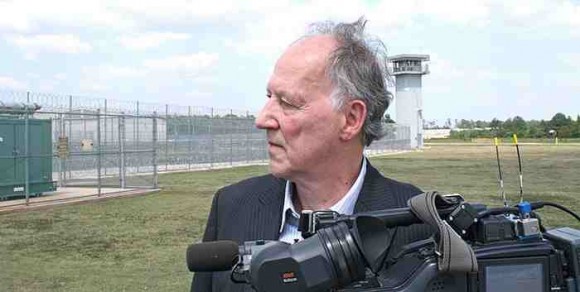Life and death matters at Global Visions Film Festival
 If you imagine documentarians to be journalists who broke out of the box and found their hearts, the Global Visions Film Festival is for you. Edmonton’s annual “non-fiction” film festival runs at venues around town through Sunday. Here are three more capsule reviews by Lowell Thomson:
If you imagine documentarians to be journalists who broke out of the box and found their hearts, the Global Visions Film Festival is for you. Edmonton’s annual “non-fiction” film festival runs at venues around town through Sunday. Here are three more capsule reviews by Lowell Thomson:
* * *
INTO THE ABYSS, directed by Werner Herzog, Germany, 2011, 107 min., Art Gallery of Alberta, March 2, 7 p.m. – This is an occasionally powerful and much lauded look at the participants in a Texas triple homicide, as one of those involved in the slaying awaits execution on death row. But does it illuminate? Not if you’ve spent any time studying the human condition, no. There’s simply nothing here we haven’t seen many times before, in more compelling forms. Director Werner Herzog spends the entire documentary looking for human connections, so that he can demonstrate what the death penalty takes away. At times, he succeeds. But there’s a naïveté in his approach, the entire concept that through the purely communal act of sharing conversation with those involve in the murders, he can illuminate. Here’s the problem with that theory: the people involved with these kinds of tragic crimes are, themselves, usually tragically ignorant to start off with, lacking in guiding social connections, devoid of much empathy given how little society has offered them, damaged by self-medication.
In other words, the pathology of crime and the sociological determinants that lead there are known to us; getting raw emotional input, while perhaps comforting to direction Werner Herzog’s own sense of profound humanism, is so lack in objectivity as to be purposeless, tautological, even regressive. In the end, though a beautiful film to look at, Into the Abyss does more to illuminate the inner workings of its auteur than his subjects.
* * *
 THE OTHER F-WORD – Directed by Andrea Blaugrund Nevins, U.S. 90 mins, Art Gallery of Alberta, March 3, 7 p.m. – This is simple and reverent documentary. Like the similar, respectful approach of the popular doc “Global Metal,” it shows us that – shock of shocks – punk rockers are actually human, despite their anti-authoritarian nature and the aggressive nature of their youngest, most angry adherents.
THE OTHER F-WORD – Directed by Andrea Blaugrund Nevins, U.S. 90 mins, Art Gallery of Alberta, March 3, 7 p.m. – This is simple and reverent documentary. Like the similar, respectful approach of the popular doc “Global Metal,” it shows us that – shock of shocks – punk rockers are actually human, despite their anti-authoritarian nature and the aggressive nature of their youngest, most angry adherents.
Of course, if you’re an intelligent person who understands the pack mentality endemic to all subcultures – and the family-like loyalty and security it offers – then this is not surprising. People who are alienated from family and authority figure trust will reach out to almost anyone who gives them a welcoming group. So in fact, basically nothing in this film will shock. Instead, it’s a fun and occasionally charming look at how guys can brag about being drunken assholes and who are honest about their assholishness and therefore are better than the assholes who criticize them … and then go home and change their daughters’ diapers.
“They want you to be the tragic figure,” says Pennywise singer Jim Lindberg, the principal focus of the film, “but who wants that? You’ll be dead before you’re 30.”
Hah! See! Caught you! Punks don’t really hate society, they just hate assholes! What a shock.
Really… pretty trite. But fun anyway. Take The Other F-Word for what it is: an instructive look at how punks grow up from angry young men into serious older men – and still tuck their kids in at night, when they’re not missing their birthdays due to touring.
The pathos just never ends, does it, gentlemen?
* * *
Bhopali – Directed by Max Carlson, 89 minutes, U.S/India, 2011, Metro Cinema, March 3, 7 p.m. – Like Peace Out, Bhopali is much larger on hyperbole than investigation, giving 95% of the film’s screen time to those seeking justice for victims of the terrible 1983 Union Carbide disaster in India, and very little time to those defending the inaction.
Having said that, Bhopali benefits from the fact that the case is already well-established: after a devastating leak of a form of gaseous cyanide called MCI, more than 25,000 Bhopal residents died horribly and up to 300,000 others were severely injured or poisoned. The tragedy continued when Union Carbide’s president, Warren Anderson, skipped bail in India to avoid charges, with the U.S. refusing to extradite him. Then, the Indian government settled the entire disaster for less than $500 million – or less than $2,000 per victim – despite what activists say is now multi-generational damage up to and including birth defects and genetic mutation.
Union Carbide was bought years ago by Dow Chemical, but the shameful handling of Bhopal by both companies – the original accident was caused by massive negligence related to cost-savings – continues to be a blight on corporate responsibility and humanism. In the end, Bhopali does its job. It’s not superlative journalism, but it is passionate and heartbreaking and it keeps the focus on the seemingly unending tragedy.
READ MORE GLOBAL VISION REVIEWS HERE: Peace Out, If a Tree Falls











